The Astrological Spread
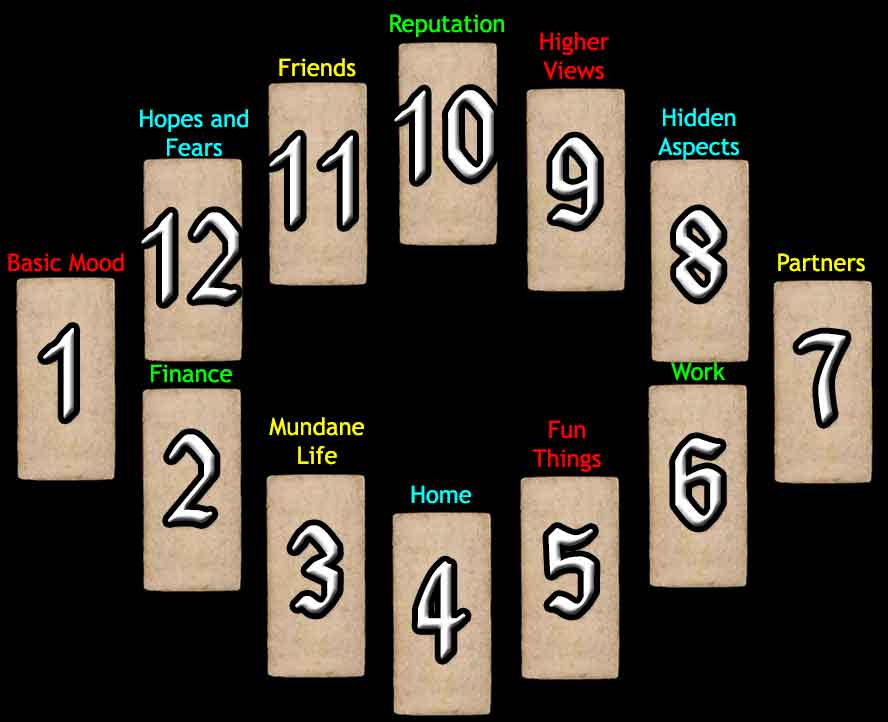
Difficulty: Complicated
The Astrological Tarot Spread is based upon houses of astrology. This complicated spread takes several steps to understand.
The first step is to interpret the tarot card for each individual position in the spread.
The second step involves further examination of the main axes. Positions 1 & 7 show the relationship theme, #1 representing the reader, #7 their partner. Positions 4 & 10 indicate motion. #4 indicates where the reader is now, and #10 suggests what they are moving towards.
The third step involves breaking down the chart into triads according to their house elements.
Positions 1, 5, & 9 represent the Fire triad, symbolising temperament and personal development.
Positions 2, 6, & 10 represent the Earth triad, concerned with materialism, money, and work.
Positions 3, 7, & 11 represent the Air triad, which has to do with thoughts, ideas, and connections with other people.
Positions 4, 8, & 12 represent the Water triad, the realm of emotions, moods, intuition, and yearnings.
Further, other patterns and correlations between certain numbers can be noted. Certain numbers such as the set of 5, 7, & 8 often speak about a particular theme.
Your Astrological Reading
| 10 | ||||||
| 11 | 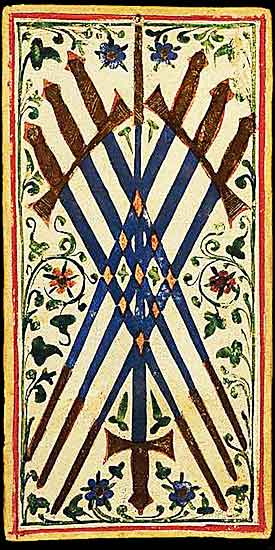 |
9 | ||||
| 12 |  |
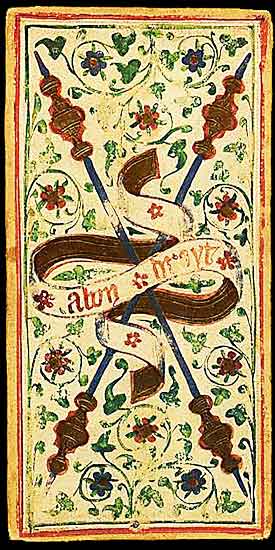 |
8 | |||
| 1 | 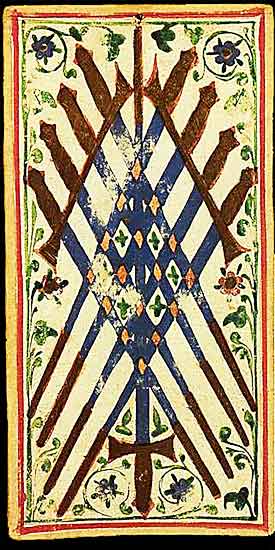 |
 |
7 | |||
 |
2 | 6 |  |
|||
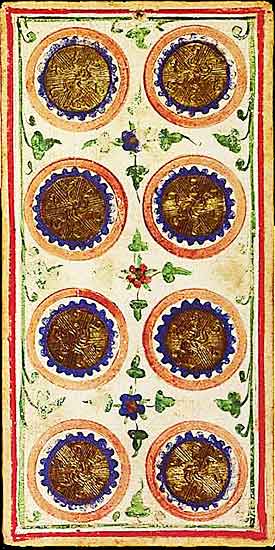 |
3 | 5 | 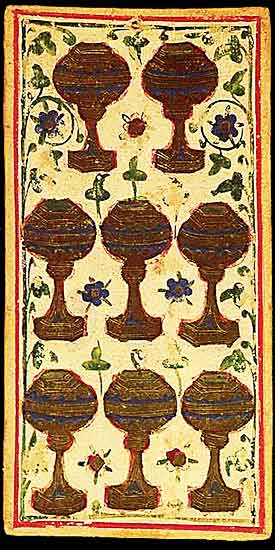 |
|||
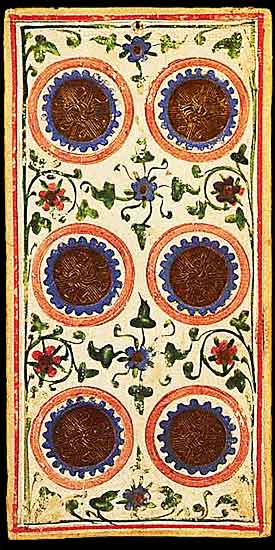 |
4 |  |
||||
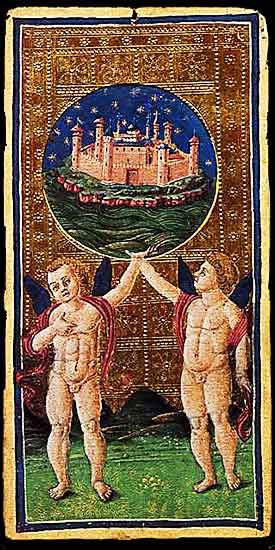 |
1: Basic Mood

The Hermit symbolises introspection, solitude, and the search for wisdom. He represents the retreat from worldly distractions to find enlightenment within.
Symbolism: The Hermit's lantern lights the way, symbolising inner guidance. His heavy robes and staff reflect humility and steadfastness, while the muted tones and golden accents emphasise the sacred nature of his solitary journey.
In Relationships: A period of introspection. The Hermit may suggest a need for space or reflection before moving forward.
In Work: Time to step back and assess your goals. The Hermit advises seeking clarity and wisdom before making decisions.
Spiritually: The Hermit represents the inner search for truth and enlightenment through meditation and solitude.
When ill-dignified: Isolation, withdrawal, or a refusal to seek help. It warns against becoming too introspective or disconnected.
2: Finance

The Eight of Coins symbolises hard work, dedication, and mastery. It speaks to the process of honing a skill or craft and emphasises the value of diligence and perseverance. This card encourages you to commit to your goals and take pride in your work.
Symbolism: The structured arrangement of the eight coins highlights precision, effort, and attention to detail. The ordered design represents a methodical approach to mastery and improvement.
In Relationships: Dedication to growing and improving a relationship. The Eight of Coins suggests putting in the effort to refine communication or deepen emotional connection.
In Work: Mastery and skill development in your professional life. This card emphasises focusing on your craft and making steady progress.
Spiritually: A time of deepening your spiritual practices and refining your beliefs. The Eight of Coins invites you to commit to your spiritual journey with consistency.
When ill-dignified: Lack of progress, poor workmanship, or burnout. The Eight of Coins warns against neglecting the effort required for success or losing focus.
3: Mundane Life

The Six of Coins represents generosity, charity, and balance in giving and receiving. It speaks to the flow of wealth, where resources are shared. This card emphasises the importance of fair exchange and the joy of helping others.
Symbolism: The even arrangement of the six coins suggests balance and fairness. The vertical alignment represents the flow of giving and receiving, highlighting harmony in financial or material exchanges.
In Relationships: A balanced relationship where both partners give and receive equally. The Six of Coins encourages acts of kindness, generosity, and mutual support.
In Work: Financial generosity or fair exchanges at work. This card suggests that assisting others can bring abundance and harmony into your career.
Spiritually: The spiritual law of giving and receiving. The Six of Coins encourages you to give freely, knowing that your actions will come back to you in time.
When ill-dignified: Imbalance in giving or receiving, manipulation, or exploitation. The Six of Coins warns against selfishness or using generosity to manipulate others.
4: Home

The World represents completion, wholeness, and the harmonious integration of all aspects of life. It is the last card of the Major Arcana, signalling the end of one journey and the beginning of another.
Symbolism: The two ethereal figures holding the globe or portal represent the union of duality and the achievement of balance. The rolling plains and distant mountains beneath the golden sky symbolise the vast potential of the world, and the figures' gesture of offering suggests a celebration of accomplishment. The card evokes cosmic harmony, completion, and the endless cycles of existence.
In Relationships: The World signifies a complete and fulfilling relationship, one where both partners are in harmony and balanced with each other. It's a time of celebration and unity.
In Work: Completion of a major goal or project. The World indicates the successful culmination of efforts, with new horizons opening up in your professional life.
Spiritually: A time of wholeness. The World signifies a sense of fulfilment and oneness with the universe, representing the final stage of spiritual evolution.
When ill-dignified: Incompletion, being stuck, or an inability to move forward. This card warns of a lack of closure or an unfinished journey that hinders your growth.
5: Fun Things

The Queen of Coins represents nurturing, abundance, and practical wisdom. She is a motherly figure who embodies warmth, security, and the ability to create a stable and prosperous environment for others. This card speaks to a balance of generosity, practicality, and a grounded approach to material wealth.
Symbolism: The Queen's regal yet nurturing posture, along with her detailed gown and the coin she holds, reflects her ability to create abundance through care, planning, and attention to detail. The golden tapestry symbolises wealth and elegance.
In Relationships: A loving, supportive partner who creates a warm, stable home. The Queen of Coins encourages a relationship rooted in care, nurturing, and shared prosperity.
In Work: A grounded, practical approach to career success. The Queen of Coins suggests using your skills to create financial security for yourself and others.
Spiritually: Spiritual abundance through nurturing practices. The Queen of Coins advises using your spiritual wisdom to care for yourself and others.
When ill-dignified: Over-protection, possessiveness, or neglecting your own needs for the sake of others. The Queen of Coins warns against being controlling or too focused on material wealth.
6: Work

The Eight of Cups represents emotional departure, seeking something deeper, and the decision to walk away from what no longer serves you. It speaks to the need for introspection and self-discovery, as you leave behind the superficial in search of deeper meaning.
Symbolism: The eight chalices in staggered rows suggest a gradual departure or transition. The placement emphasises movement and emotional progression. The ornate details of the cups reflect the emotional investment required to make this decision.
In Relationships: A decision to move on from a relationship or emotional situation that no longer fulfils you. This card represents a quest for deeper connection or personal growth.
In Work: Leaving behind a job or situation that no longer aligns with your values or goals. The Eight of Cups suggests you are ready to pursue something more meaningful.
Spiritually: The journey towards deeper spiritual fulfilment. This card invites you to leave behind outdated beliefs or practices in search of greater understanding.
When ill-dignified: Running away from emotional problems or avoiding growth. The Eight of Cups warns against making impulsive decisions or leaving before you've fully processed emotions.
7: Partners

The Fool symbolises new beginnings, innocence, and an open-hearted journey. He represents the spirit of adventure and trust in the unknown, unburdened by experiences or material concerns. His path is one of discovery, where curiosity leads the way.
Symbolism: The vagabond's tattered clothing reflects detachment from societal norms, while his staff and bundle suggest minimal baggage—both physical and emotional. The golden background highlights his eternal and universal journey. His carefree, open-mouthed expression conveys both the naivety of youth and the wisdom of freedom from expectations.
In Relationships: A signal to take risks or approach relationships with spontaneity and trust. It cautions against naivety or reckless behaviour.
In Work: An invitation to embrace a new path or project with an open mind. The Fool encourages experimentation and trust in one's instincts.
Spiritually: The Fool represents faith in the journey ahead and the courage to step into the unknown. He invites the seeker to trust the divine flow.
When ill-dignified: Foolishness, poor judgement, or recklessness. It warns against ignoring practicalities or rushing ahead blindly.
8: Hidden Aspects

The Chariot symbolises determination, willpower, and triumph through self-discipline. It represents the ability to move forward and achieve success by mastering conflicting forces.
Symbolism: The stationary horses reflect control rather than speed, while the charioteer's detailed attire and golden background emphasise victory and refinement. The calm pose suggests strength in discipline over chaos.
In Relationships: A time to take charge of your relationship's direction. The Chariot signals progress but warns against domination.
In Work: Triumph through focus and determination. It's a call to harness all resources and overcome obstacles confidently.
Spiritually: The Chariot encourages the mastery of inner conflicts to progress along the spiritual path.
When ill-dignified: Loss of direction, lack of control, or excessive force. It warns against being carried away by ambition or unchecked emotions.
9: Higher Views

The Two of Staves symbolises duality, decision-making, and the balancing of forces. It represents a time when a choice must be made, but the way forward is clear only through contemplation and internal balance.
Symbolism: The two staffs, arranged symmetrically, reflect the concept of partnership, opposition, or balance. The delicate flourishes at the bases suggest that, though the decision may be significant, it need not be rushed. The flowery background continues the theme of elegance, inviting you to focus on the inner dynamics between opposing forces.
In Relationships: A decision lies ahead—whether to commit, balance differences, or choose a path together. This card invites careful deliberation before taking action.
In Work: A time to evaluate your options, whether expanding your horizons or staying the course. It speaks to the importance of balancing ambition with patience.
Spiritually: The Two suggests an inner conflict or a need to find balance within yourself. This card encourages introspection and a search for harmony.
When ill-dignified: Indecision, imbalance, or the inability to make a clear choice. You may be stuck in a state of conflict, unable to resolve opposing forces in your life.
10: Reputation

The Seven of Swords represents secrecy, deception, and strategy. It speaks to situations where you may feel the need to be clever, sneaky, or evasive to get what you want. This card can indicate an act of stealth or even betrayal, but it also highlights the need for careful planning and discretion.
Symbolism: The unbalanced arrangement of the swords suggests movement, stealth, and uncertainty. The overlapping blades hint at hidden motives or the complexity of a situation that requires more than just straightforward action.
In Relationships: Hidden agendas or deception. The Seven of Swords advises caution, as someone may not be entirely honest with you or you may be hiding something.
In Work: Strategic planning or taking calculated risks. The Seven of Swords can suggest that you are working behind the scenes to achieve your goals, but caution is needed to avoid deceit.
Spiritually: Secrets or hidden truths within your spiritual path. This card encourages you to examine any areas where dishonesty or avoidance might be hindering your growth.
When ill-dignified: Betrayal, dishonesty, or evasion. The Seven of Swords warns against deceitful actions or neglecting the truth for personal gain.
11: Friends

The Knave of Staves represents youthful enthusiasm, exploration, and new beginnings. This card signifies a time of discovery and creative energy, where the world is seen with fresh eyes.
Symbolism: The Knave, holding a staff and standing confidently, embodies the spirit of adventure and curiosity. The lush green ground beneath their feet suggests new beginnings rooted in fertile possibilities, while their elaborate, dark robes signify maturity and depth despite their youth. The golden background emphasises their potential and promise.
In Relationships: A new, exciting chapter in your romantic life. The Knave of Staves suggests the beginning of a passionate connection or the rekindling of youthful excitement.
In Work: A time of learning and exploration in your professional life. The Knave of Staves indicates being on the verge of an exciting new venture or creative project.
Spiritually: The beginning of a new spiritual path or awakening. This card invites you to approach your spiritual journey with open-mindedness and enthusiasm.
When ill-dignified: Immaturity, impulsiveness, or lack of direction. This suggests you may be rushing into something without considering the consequences.
12: Hopes and Fears

The Nine of Swords represents anxiety, nightmares, and mental distress. It signals a time of intense worry or fear that is often exaggerated or self-created. This card highlights the impact of negative thoughts and the toll they take on your mental health.
Symbolism: The formation of eight swords opposing the one below reflects the intense focus on worry, creating anxiety or mental overload. The repetitive pattern of the swords emphasises the sharpness of the thoughts that cause distress.
In Relationships: Anxiety, regret, or guilt. The Nine of Swords can indicate that fear or obsessive thoughts are clouding your ability to move forward.
In Work: Worry or mental stress related to your job or professional situation. This card points to the emotional toll that stress and overthinking are taking on you.
Spiritually: A period of spiritual doubt or anxiety. The Nine of Swords advises you to confront your fears and trust that they are only mental projections, not reality.
When ill-dignified: Escalated stress or overwhelming fear that leads to paralysis. The Nine of Swords warns against letting anxiety dominate your life or prevent you from taking action.